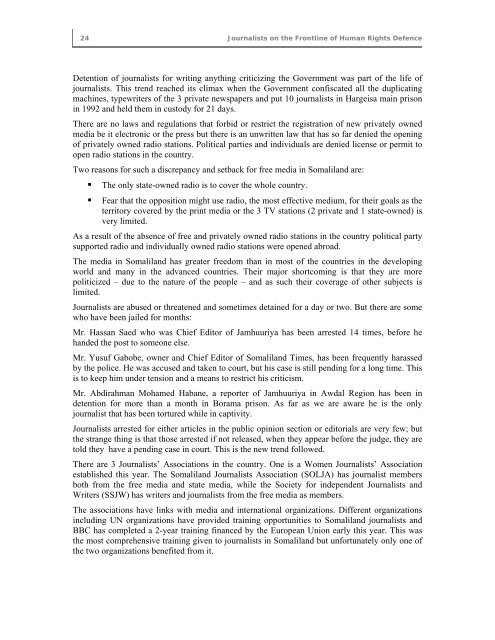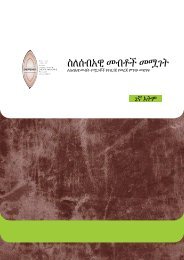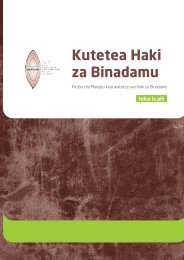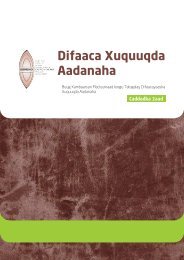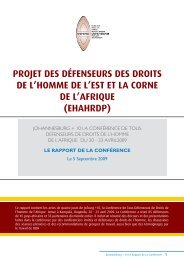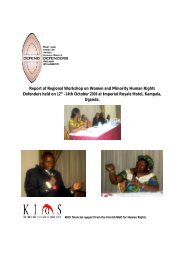English PDF - East and Horn of Africa Human Rights Defenders ...
English PDF - East and Horn of Africa Human Rights Defenders ...
English PDF - East and Horn of Africa Human Rights Defenders ...
Create successful ePaper yourself
Turn your PDF publications into a flip-book with our unique Google optimized e-Paper software.
24Journalists on the Frontline <strong>of</strong> <strong>Human</strong> <strong>Rights</strong> DefenceDetention <strong>of</strong> journalists for writing anything criticizing the Government was part <strong>of</strong> the life <strong>of</strong>journalists. This trend reached its climax when the Government confiscated all the duplicatingmachines, typewriters <strong>of</strong> the 3 private newspapers <strong>and</strong> put 10 journalists in Hargeisa main prisonin 1992 <strong>and</strong> held them in custody for 21 days.There are no laws <strong>and</strong> regulations that forbid or restrict the registration <strong>of</strong> new privately ownedmedia be it electronic or the press but there is an unwritten law that has so far denied the opening<strong>of</strong> privately owned radio stations. Political parties <strong>and</strong> individuals are denied license or permit toopen radio stations in the country.Two reasons for such a discrepancy <strong>and</strong> setback for free media in Somalil<strong>and</strong> are:• The only state-owned radio is to cover the whole country.• Fear that the opposition might use radio, the most effective medium, for their goals as theterritory covered by the print media or the 3 TV stations (2 private <strong>and</strong> 1 state-owned) isvery limited.As a result <strong>of</strong> the absence <strong>of</strong> free <strong>and</strong> privately owned radio stations in the country political partysupported radio <strong>and</strong> individually owned radio stations were opened abroad.The media in Somalil<strong>and</strong> has greater freedom than in most <strong>of</strong> the countries in the developingworld <strong>and</strong> many in the advanced countries. Their major shortcoming is that they are morepoliticized – due to the nature <strong>of</strong> the people – <strong>and</strong> as such their coverage <strong>of</strong> other subjects islimited.Journalists are abused or threatened <strong>and</strong> sometimes detained for a day or two. But there are somewho have been jailed for months:Mr. Hassan Saed who was Chief Editor <strong>of</strong> Jamhuuriya has been arrested 14 times, before heh<strong>and</strong>ed the post to someone else.Mr. Yusuf Gabobe, owner <strong>and</strong> Chief Editor <strong>of</strong> Somalil<strong>and</strong> Times, has been frequently harassedby the police. He was accused <strong>and</strong> taken to court, but his case is still pending for a long time. Thisis to keep him under tension <strong>and</strong> a means to restrict his criticism.Mr. Abdirahman Mohamed Habane, a reporter <strong>of</strong> Jamhuuriya in Awdal Region has been indetention for more than a month in Borama prison. As far as we are aware he is the onlyjournalist that has been tortured while in captivity.Journalists arrested for either articles in the public opinion section or editorials are very few; butthe strange thing is that those arrested if not released, when they appear before the judge, they aretold they have a pending case in court. This is the new trend followed.There are 3 Journalists’ Associations in the country. One is a Women Journalists’ Associationestablished this year. The Somalil<strong>and</strong> Journalists Association (SOLJA) has journalist membersboth from the free media <strong>and</strong> state media, while the Society for independent Journalists <strong>and</strong>Writers (SSJW) has writers <strong>and</strong> journalists from the free media as members.The associations have links with media <strong>and</strong> international organizations. Different organizationsincluding UN organizations have provided training opportunities to Somalil<strong>and</strong> journalists <strong>and</strong>BBC has completed a 2-year training financed by the European Union early this year. This wasthe most comprehensive training given to journalists in Somalil<strong>and</strong> but unfortunately only one <strong>of</strong>the two organizations benefited from it.


